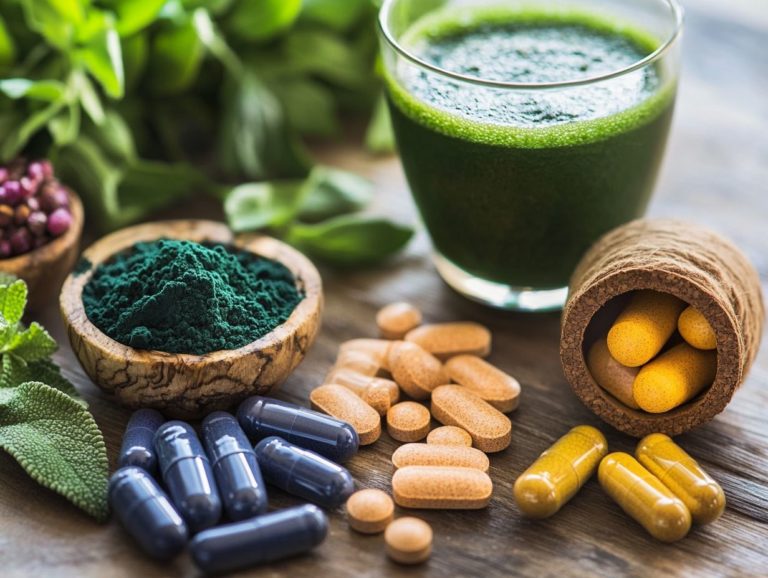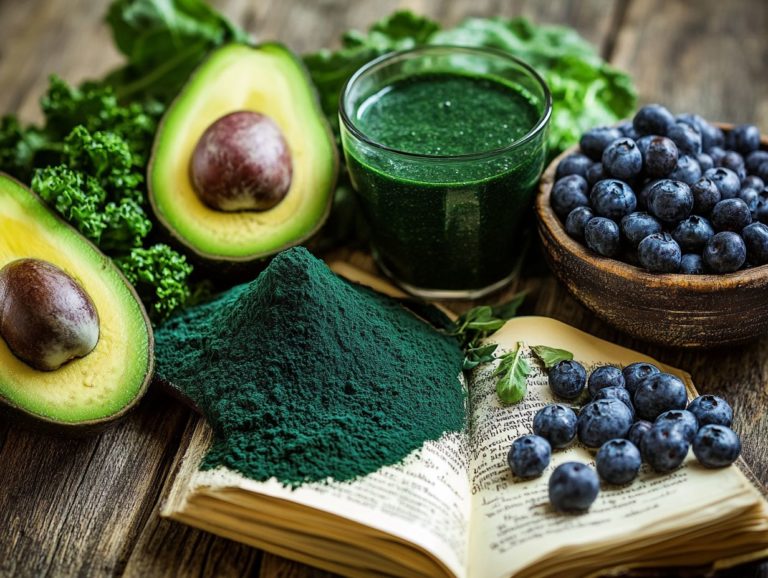What Are the Best Resources for Holistic Nutrition?
Navigating the world of holistic nutrition can feel like a thrilling adventure, but it may also seem daunting. Finding the right resources is essential for anyone wanting to elevate their diet or enhance their health.
Let s explore invaluable resources, from local farmers’ markets to online blogs and courses. Whether you re a seasoned practitioner or just starting your holistic journey, these resources will support you in embracing a healthier lifestyle.
Immerse yourself now to discover the best ways to nourish your body and mind!
Contents
- Key Takeaways:
- 1. Whole Foods
- 2. Farmers’ Markets
- 3. Local Farms
- 4. Community Supported Agriculture (CSA)
- 5. Health Food Stores
- 6. Online Retailers
- 7. Holistic Nutritionists
- 8. Naturopathic Doctors
- 9. Holistic Nutrition Blogs and Websites
- 10. Books on Holistic Nutrition
- 11. Podcasts and Webinars
- 12. Social Media Influencers
- 13. Holistic Nutrition Courses and Certifications
- 14. Local Workshops and Events
- 15. Support Groups and Online Communities
- Frequently Asked Questions
- What Are the Best Resources for Holistic Nutrition?
- What are some recommended books for learning about holistic nutrition?
- Are there any useful blogs that focus on holistic nutrition?
- Do you have any recommendations for podcasts about holistic nutrition?
- Are there any reputable online courses that cover holistic nutrition?
- Is there a professional certification for holistic nutrition?
Key Takeaways:
- Shop local: Whole foods, farmers’ markets, and local farms provide fresh, organic produce while supporting your community. Don t miss out!
- Professional guidance: Consult a holistic nutritionist or naturopathic doctor for personalized health advice.
- Educate yourself: Explore online resources, books, podcasts, and workshops to learn about holistic nutrition.
1. Whole Foods
Whole foods are vital for your holistic health journey. They offer nutrients that enhance physical wellness and reduce processed food intake.
By prioritizing nutrient-dense options, you can create balanced meals that support your health and emotional well-being.
These foods packed with vitamins and minerals include:
- Fruits
- Vegetables
- Whole grains
- Nuts
- Seeds
Whole foods nourish your body and elevate culinary experiences. While supplements may fill gaps, they can t replicate the benefits of fresh foods.
Resources like the USDA Food and Nutrition Information are invaluable for making informed dietary choices.
2. Farmers’ Markets
Farmers’ markets connect you with local farms, offering fresh, organic produce that supports your health. These vibrant hubs showcase seasonal produce at its peak freshness.
Buying from these markets promotes safer food practices and strengthens local economies. Many even offer subscriptions through Community Supported Agriculture (CSA) programs for regular access to farm-fresh goods.
This interconnectedness fosters a holistic approach that engages nutrition, community, and environmental consciousness.
3. Local Farms
Local farms play a pivotal role in promoting holistic health. They offer sustainable agriculture practices that yield fresh, nutritious food while nurturing community connections.
Local farms do more than supply seasonal produce; they embody the very essence of farm-to-table practices, enhancing both food quality and flavor. By prioritizing local sourcing, you not only minimize the carbon footprint linked to transportation but also bolster local economies. This ensures that financial resources circulate within your community.
As a result, you gain better health and wellness through greater access to organic options. These options often pack a stronger nutrient punch. Community Supported Agriculture, or CSA, models take these benefits even further, allowing you to invest directly in local farms and receive a steady stream of fresh products. This approach strengthens the bond between farmers and the community and cultivates a shared sense of responsibility towards sustainable eating habits.
4. Community Supported Agriculture (CSA)
Community Supported Agriculture, or CSA, is a way to connect with local farms. This ensures you have access to fresh, high-quality produce while championing holistic nutrition and sustainable practices.
By subscribing to a CSA, you invest in a share of the harvest and receive a delightful array of seasonal fruits and vegetables delivered to you regularly. This connection bridges the gap between consumers and producers, inviting you to explore a variety of nutritious options that might be absent from conventional grocery stores.
The advantages extend well beyond simply enjoying fresh food. They encourage balanced meals brimming with essential vitamins and minerals while adhering to rules that keep food safe to eat upheld by local farmers. By embracing this model, you actively contribute to transforming food systems, bolstering local economies, and nurturing a sustainable environment that embodies the principles of holistic health.
5. Health Food Stores
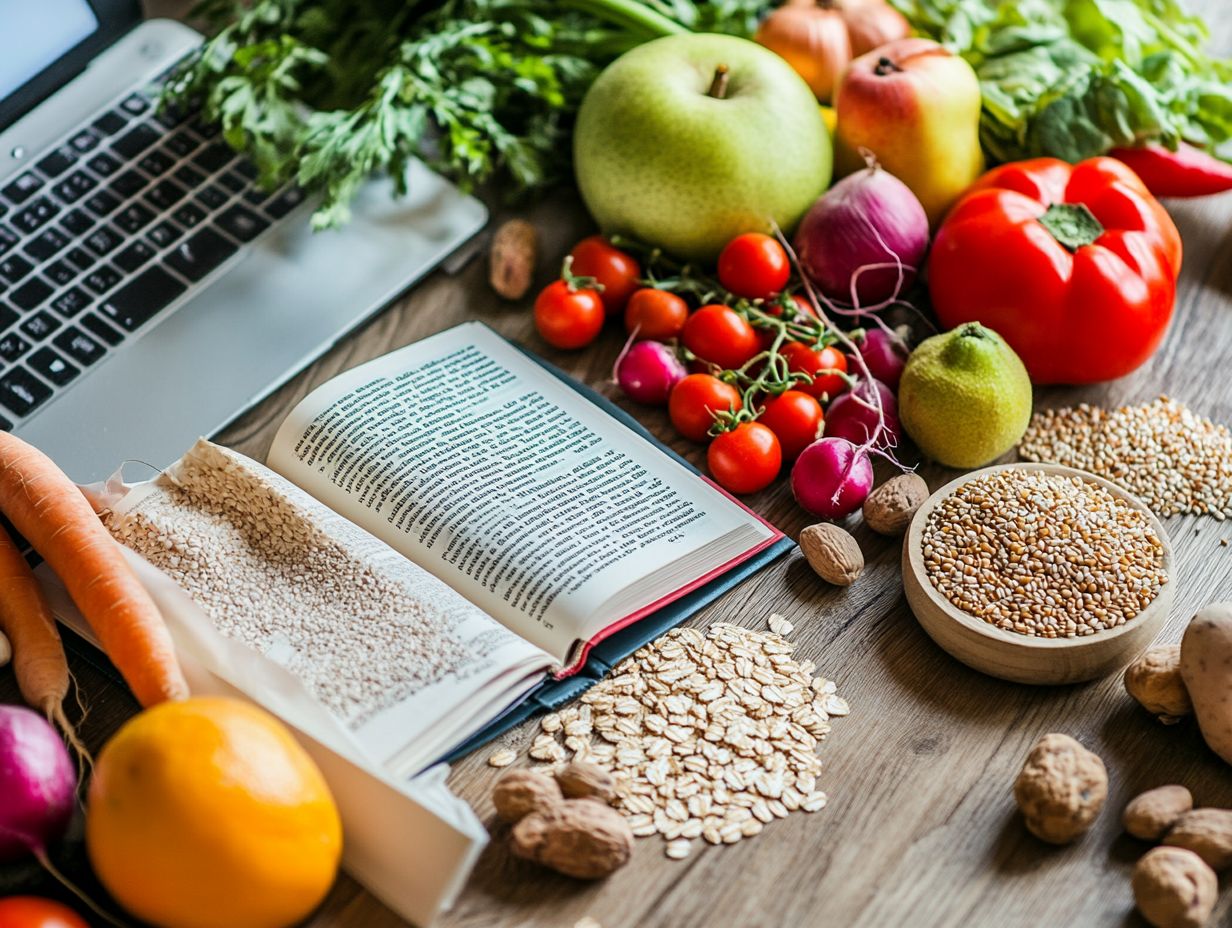
Health food stores are must-visit spots for anyone wanting to boost their health. They offer an extensive array of vitamins and minerals that support health and nutritious foods designed to promote overall wellness.
Within these establishments, you ll discover an impressive selection of healthy fats, such as avocados, nuts, and seeds. These are complemented by organic produce that minimizes your exposure to harmful pesticides. Specialty vitamins and minerals tailored to meet various health needs await you, from boosting immune function to supporting gut health.
Understanding food labels is essential in your journey. This gives you the power to make informed choices by highlighting crucial nutrients and potential allergens. Ultimately, these stores not only provide high-quality products but also cultivate a community centered around vibrant living and comprehensive well-being.
6. Online Retailers
Online retailers have transformed your access to holistic health products. They offer a seamless platform for purchasing dietary supplements and nutrition resources that promote overall wellness.
This shift to digital shopping not only saves you precious time but also unveils an extensive selection that traditional stores simply can’t rival. You can effortlessly explore various brands and formulations from the comfort of your home. This makes it much easier to discover products that align perfectly with your holistic health goals.
The ability to compare prices across multiple platforms gives you the power to make informed decisions. This ensures you maximize value without sacrificing quality. In a world where health is paramount, sourcing products that prioritize natural ingredients and sustainable practices can significantly elevate your overall well-being.
Visit your local farm today to discover fresh produce!
7. Holistic Nutritionists
Holistic nutritionists are essential allies on your journey to optimal health, providing personalized dietary advice that fuels your health journey while embracing your physical, emotional, and spiritual well-being. Understanding the science behind holistic nutrition can further enhance this approach.
They evaluate your unique needs and health concerns, crafting tailored health plans that align seamlessly with your lifestyle and preferences. These professionals understand that food is more than mere fuel; it nurtures your entire being, addressing health-related symptoms comprehensively.
By exploring how various nutrients influence your mood, energy levels, and overall vitality, they empower you with the knowledge to make sustainable dietary changes. This whole-person care approach equips you with the tools for lasting health improvements and fosters a deeper connection between you and the food you consume, promoting both physical health and emotional balance.
8. Naturopathic Doctors
Naturopathic doctors are health professionals who take a whole-person care approach to wellness, emphasizing disease prevention and harnessing the body s innate ability to heal itself through natural remedies and lifestyle changes.
They prioritize your education, empowering you to make informed choices about your health while providing dietary guidance tailored specifically to your unique needs. By addressing the underlying causes of health issues rather than merely treating symptoms, they craft personalized wellness plans that promote lasting well-being.
They often collaborate with other healthcare providers, integrating various disciplines to ensure you receive comprehensive care. This teamwork enhances the effectiveness of treatments and fosters a supportive environment as you embark on your journey to optimal health.
9. Holistic Nutrition Blogs and Websites
Holistic nutrition blogs and websites are invaluable resources for anyone seeking credible nutrition information, delicious healthy recipes, and insights into what to include in a holistic nutrition toolkit that nurtures both body and soul.
These platforms explore a rich variety of topics, from the significance of whole foods foods that are minimally processed and free from artificial substances and plant-based diets to the impact of mindfulness on eating habits. Experts in the field frequently share insights on the latest nutrition trends, offering evidence-based advice that empowers you to make informed choices.
You ll often find innovative recipe ideas tailored to various dietary preferences, making healthy eating both accessible and enjoyable. By fostering a sense of community and support, these resources inspire you to embrace lifestyle changes that enhance your overall well-being while promoting a holistic approach to health.
10. Books on Holistic Nutrition
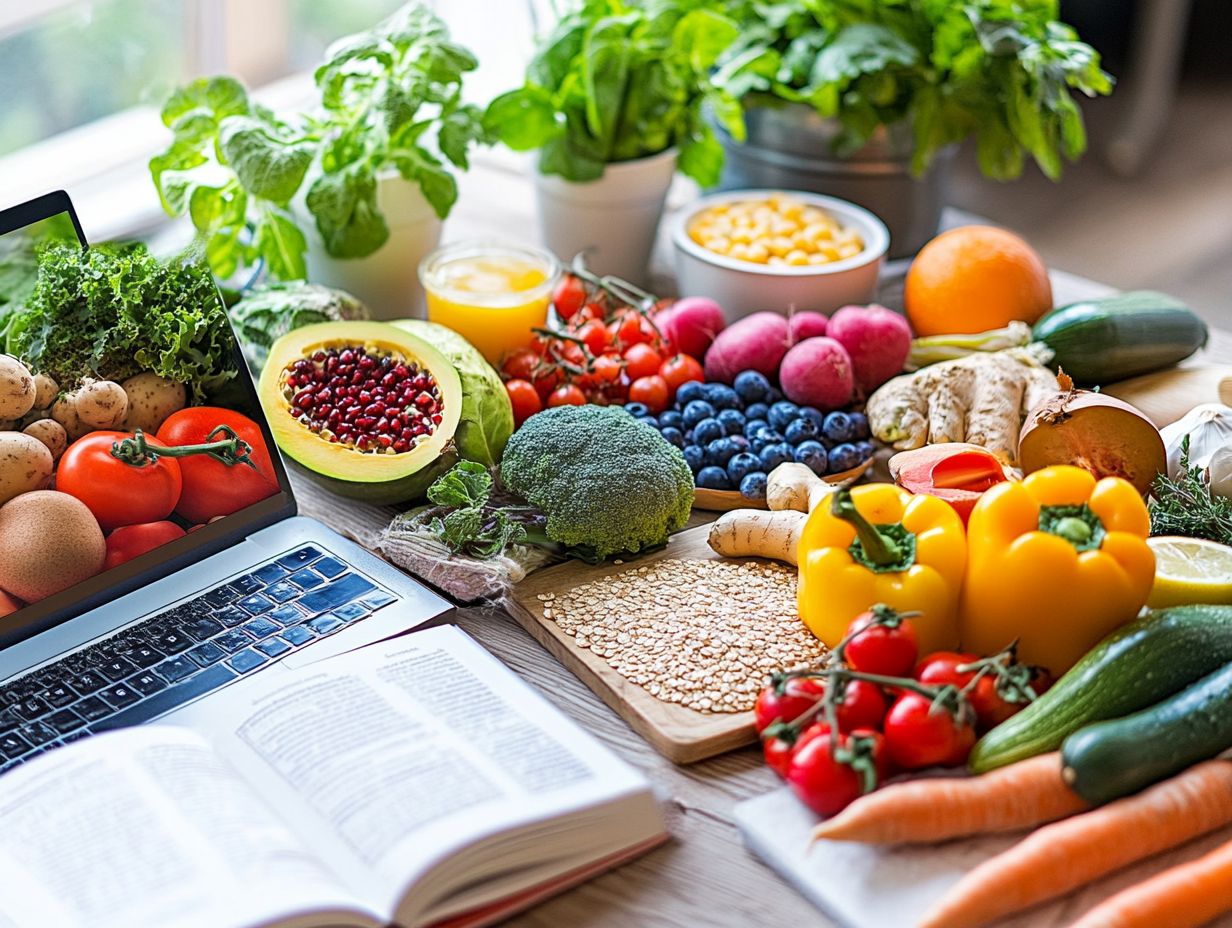
Books on holistic nutrition offer a treasure trove of knowledge, providing you with insights into dietary guidance, health sciences, and practical strategies for understanding what foods are essential in holistic nutrition to achieve optimal wellness.
Among the prominent voices in this field, you ll find authors like Dr. Andrew Weil, whose book “Eating Well for Optimal Health” is notable for its comprehensive approach to integrating whole foods into your daily diet. Similarly, “The New Whole Foods Encyclopedia” by Rebecca Wood proves to be an invaluable reference, helping you understand the diverse nutrients present in various foods.
These resources inform and empower you to make educated choices about your diet. By harmonizing traditional practices with modern science, these titles create an accessible pathway for anyone eager to elevate their health through informed nutritional practices.
11. Podcasts and Webinars
Podcasts and webinars have become increasingly popular avenues for sharing overall health information, effortlessly connecting you with experts and offering valuable nutrition resources wherever you are.
Their easy accessibility enables you to explore various aspects of wellness be it plant-based diets or mindfulness practices (activities that help you stay present and aware) all while juggling your daily tasks. The convenience of tuning in during your commute or workout allows you to seamlessly weave health education into your lifestyle.
Engaging with a wide array of topics not only broadens your personal knowledge but also fosters a sense of community through interaction with hosts and fellow listeners.
If you’re eager to delve deeper into holistic nutrition, shows like “The Rich Roll Podcast” and “The Doctor’s Farmacy” serve as fantastic resources. They combine expert insights with practical tips, making your journey toward better health both enlightening and enjoyable.
12. Social Media Influencers
Social media influencers significantly shape how you perceive holistic nutrition, championing health and wellness practices that encourage lifestyle changes and enhance your overall well-being.
These individuals use their platforms effectively to educate you on the importance of balanced diets, mindful eating, and incorporating natural, whole foods into your daily routine. By sharing engaging content think visually stunning healthy recipes and insightful posts about nutrient-rich ingredients they inspire you to adopt more health-conscious habits.
Prominent figures like nutrition coach and recipe developer Jessica Cording, along with vibrant food blogger Ella Mills, maximize their influence to dispel common myths surrounding nutrition, emphasizing the benefits of a holistic approach. Their genuine passion for wellness resonates deeply, motivating you to embark on your own journey toward a healthier lifestyle.
13. Holistic Nutrition Courses and Certifications
Holistic nutrition courses and certifications empower you with the essential knowledge and skills to guide others on their wellness journeys, focusing on a well-rounded approach to nutrition.
You can find many options, from flexible online courses to immersive in-person workshops, accommodating various learning styles and schedules. By diving into different curricula, you can uncover specialized training that aligns with your career aspirations whether you envision yourself as a nutrition coach, wellness educator, or holistic health practitioner.
The significance of education in this field is immense; it empowers you with evidence-based insights crucial for providing personalized dietary advice. This, in turn, fosters healthier lifestyles and supports a wide spectrum of health-related professions.
14. Local Workshops and Events
Get ready for vibrant gatherings centered around holistic health that present you with invaluable opportunities for community engagement, creating meaningful connections with others who share your interest in nutrition resources and wellness.
These gatherings include interactive cooking classes that guide you in crafting nutritious meals with seasonal ingredients, and enlightening nutrition seminars led by local experts who delve into the science of food and its profound impact on your overall well-being. Community events often boast panel discussions and wellness fairs, allowing you to explore a variety of holistic practices like yoga, meditation, and herbal medicine.
By championing these initiatives, you not only deepen your understanding of health but also invigorate local economies and foster a culture of wellness that resonates well beyond individual practices. Don t miss out on local workshops!
15. Support Groups and Online Communities
Support groups and online communities centered around holistic health offer invaluable networks for guidance, sharing experiences, and navigating lifestyle changes related to nutrition and wellness.
These platforms connect you with others who share similar health concerns and provide a wealth of shared knowledge and resources. By engaging in discussions, you can gain valuable insights on coping strategies for various symptoms, from stress management to dietary adjustments.
The emotional support you find in these spaces can be an important part of your growth, nurturing a sense of belonging and encouragement. This shared knowledge strengthens you, gives you the power to take charge of your health, and ultimately leads to meaningful improvements in your overall well-being.
Frequently Asked Questions
What Are the Best Resources for Holistic Nutrition?
The best resources for holistic nutrition include books, blogs, podcasts, online courses, and professional certifications.
What are some recommended books for learning about holistic nutrition?
Some highly recommended books for learning about holistic nutrition are “In Defense of Food” by Michael Pollan, “The Body Ecology Diet” by Donna Gates, and “The China Study” by T. Colin Campbell, along with exploring the long-term benefits of holistic nutrition.
Are there any useful blogs that focus on holistic nutrition?
Yes, there are many great blogs that focus on holistic nutrition. Some popular ones include MindBodyGreen, The Wellness Mama, and Nutrition Stripped.
Do you have any recommendations for podcasts about holistic nutrition?
Absolutely! Some informative and entertaining podcasts about holistic nutrition are The Ultimate Health Podcast, The Nutrition Diva’s Quick and Dirty Tips, and The Model Health Show.
Are there any reputable online courses that cover holistic nutrition?
Yes, there are several reputable online courses that cover holistic nutrition and why it matters. Some examples include the Institute for Integrative Nutrition, the Academy of Culinary Nutrition, and the Holistic Nutrition Lab.
Is there a professional certification for holistic nutrition?
Yes, there are several professional certifications for holistic nutrition. Some recognized ones include the Board Certified in Holistic Nutrition credential from the National Association of Nutrition Professionals and the Certified Holistic Nutritionist certification from the National Association of Nutrition Professionals.
Join a group today and connect with others on your wellness journey!
Explore these resources now for a healthier tomorrow!

